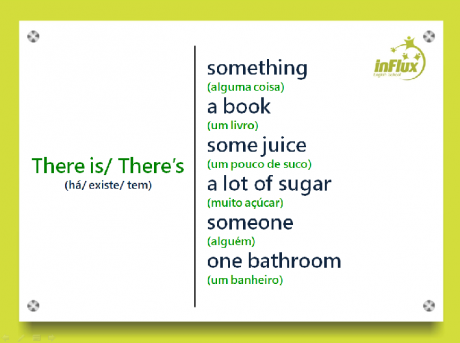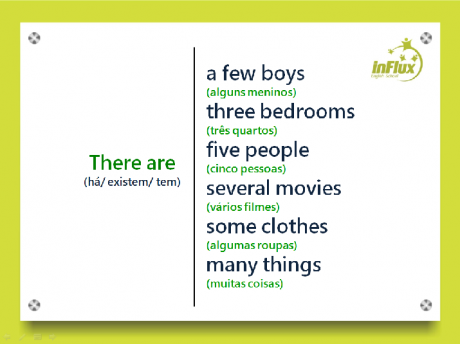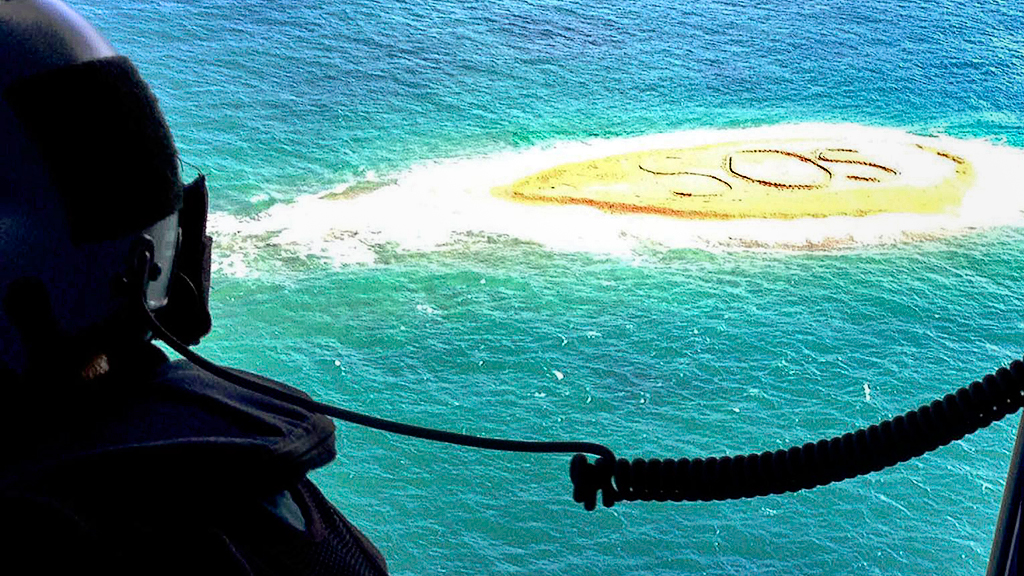Usando o verbo “haver” em inglês – there is X there are
- Categorias
- Gramática
There is e there are são bons exemplos de que não podemos observar palavras isoladamente em uma frase. Compostas por palavras bem familiares a estudantes básicos, essas expressões têm significado bem diferente do que as palavras teriam separadas. Combinadas, elas são as equivalentes em inglês do verbo “haver” no presente. O verbo “haver” em português pode ser um tanto formal, então no dia a dia usamos mais a equivalência “tem” ou “existe/ existem” para there is ou there are. Portanto:
There is = há/existe/tem
There are = há/existem/tem
O importante agora é vocês conseguirem diferenciar quando usamos there is – ou a forma contraída there’s que é a mais usada quando falamos – ou quando usamos there are. Observem algumas combinações nos quadros abaixo:
There’s a book on my backpack. Is it yours? Tem um livro em cima da minha mochila. É seu?
A – Can I have something to drink? B – There is some juice in the fridge. A – Eu posso beber alguma coisa? B – Tem um pouco de suco na geladeira.
I don’t drink soda because there’s a lot of sugar in it. Eu não bebo refrigerante porque tem muito açúcar.
I’m sure there’s someone at home now. Eu tenho certeza que tem alguém em casa agora.
There is just one bathroom in his apartment. Tem só um banheiro no apartamento dele.
I guess there’s something wrong with my computer. Eu acho que tem alguma coisa errada com o meu computador.
There are only a few boys in her class. Tem só alguns meninos na sala dela.
I live in a comfortable big house. There are three bedrooms in it. Eu moro num apartamento confortável e grande. Há três quartos nele.
There are five people in my family: my parents, my two brothers and I. Tem cinco pessoas na minha família: meus pais, meus dois irmãos e eu.
There are a lot of movies I would like to watch. Há muitos filmes que eu gostaria de assistir.
My room is not a big mess. There are only some clothes on the floor. Meu quarto não está muito bagunçado. Tem só algumas roupas no chão.
Acima, temos somente frases afirmativas. Se quisermos fazer uma frase negativa com there is ou there are, usamos there isn’t ou there aren’t. Vejam algumas frases negativas:
I’m sure there isn’t anyone at home now. Eu tenho certeza que não tem ninguém em casa agora.
There isn’t any money in my wallet. Não tem nenhum dinheiro na minha carteira.
There aren’t many cities I would like to visit. Não há muitas cidades que eu gostaria de visitar.
I think there aren’t good movies on this weekend. Eu acho que não tem bons filmes em cartaz nesse final de semana.
Já se quisermos fazer frases interrogativas, usaremos as palavras invertidas is there ou are there. Observe alguns exemplos:
Is there anything wrong with your car? Tem alguma coisa errada com o seu carro?
Is there a magazine I can read while you take a shower? Tem uma revista que eu possa ler enquanto você toma banho?
How many people are there in your family? Quantas pessoas tem na sua família?
Are there many students in her class? Tem muitos alunos na sala dela?
Por falar em perguntas, quando formos responder podemos usar respostas curtas como:
Yes, there is. Sim, tem/ existe/ há.
No, there isn’t. Não, não tem/ existe/ há.
Yes, there are. Sim, tem/ existem/ há.
No, there aren’t. Não, não tem/ existem/ há.
A – Is there sugar in the tea? Tem açúcar no chá?
B – Yes, there is. Sim, tem.
A -Is there anyone in the kitchen? Há alguém na cozinha?
B – No, there isn’t. Não, não há.
A -Are there interesting books in the library? Há livros interessantes na biblioteca?
B -Yes, there are. Sim, há.
A – Are there many things for us to do? Tem muitas coisas pra nós fazermos?
B – No, there aren’t. Não, não tem.
Como mencionei no início do texto, essas são as formas do verbo “haver” no presente. Em breve, veremos como usá-lo no passado e no futuro também!
Take care, guys!






























